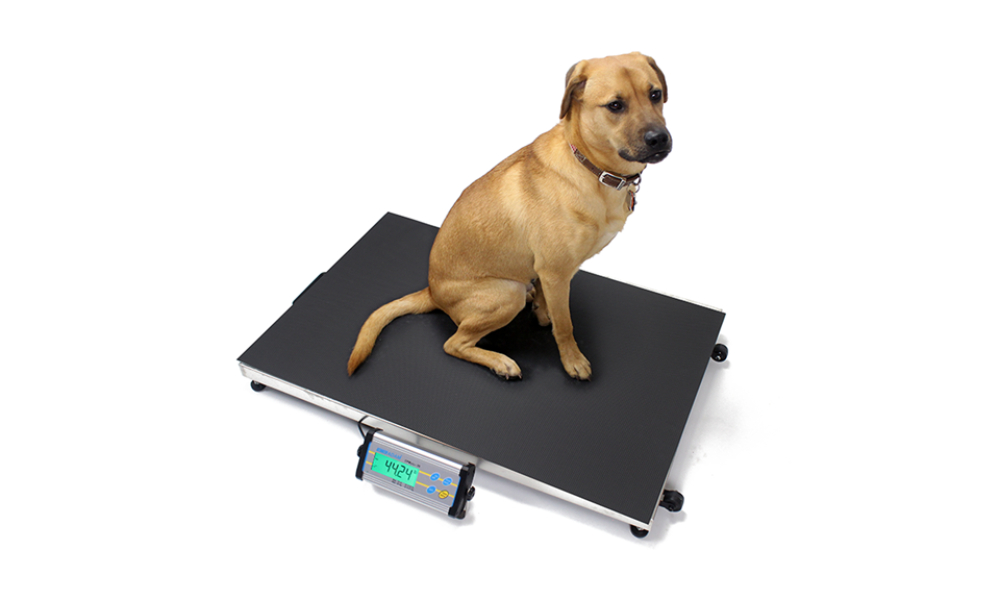When it comes to monitoring the health of our pets, weight plays a crucial role in understanding their overall well-being. For owners of larger dog breeds, this task can be more challenging. Larger pets, such as Great Danes, Mastiffs, and St. Bernards, can be difficult to weigh with traditional pet scales that are designed for smaller animals.
As a result,floor scales designed for large pets are becoming an essential tool for those with larger furry companions. These scales offer both accuracy and comfort, allowing pet owners and veterinarians to ensure that these bigger breeds maintain a healthy weight.
Why Weighing Larger Pets is Crucial
For large dog breeds, weight management is especially important. Obesity in dogs can lead to a range of health issues, including joint problems, heart disease, diabetes, and even a reduced lifespan. Regularly weighing larger pets can help pet owners detect potential weight gain early, enabling them to adjust their pet’s diet, exercise regimen, or medical care accordingly.
Traditional pet scales, typically meant for small dogs or cats, often lack the capacity to handle larger pets or provide precise readings for animals over 30 pounds. This is where floor scales come in—these are designed to handle bigger animals comfortably and provide reliable weight readings for more accurate health assessments.
Features of Floor Scales for Large Pets
- Large Platform Size: Floor scales for large pets typically feature a broad, flat platform that can accommodate big animals with ease. A larger platform allows pets to stand comfortably, which is essential to ensure they don’t feel cramped or anxious during the weighing process. The stable surface reduces the likelihood of the pet shifting or moving, helping ensure accurate readings.
- Higher Weight Capacity: Unlike traditional pet scales, floor scales designed for larger pets can handle animals that weigh 100 pounds or more. Some models offer weight capacities of up to 500 pounds, making them suitable for the heaviest breeds. It’s essential to select a heavy duty weighing scale with an adequate weight capacity to ensure the scale doesn’t get damaged and can provide accurate measurements.
- Precise Measurement: Accuracy is a key concern when it comes to weighing large pets. For large animals, even small fluctuations in weight can indicate health changes, so precise measurement is vital. High-quality floor scales provide exact weight readings, often down to a fraction of a pound or kilogram. Some advanced models even feature digital displays that allow you to track small shifts in weight over time.
- Non-Slip Surface: A non-slip surface is essential for both safety and accuracy. It ensures that pets can stand securely without slipping, which helps prevent accidents and ensures the scale provides an accurate measurement. Many models feature textured surfaces or rubber mats to keep the pet steady while being weighed.
- Durable and Easy to Clean: Larger pets tend to be heavier, and they may also be messier than their smaller counterparts. For example, some big dogs may have muddy paws after walks, or they may shed more than smaller breeds. Floor scales designed for large pets are often built with durable, easy-to-clean materials to ensure hygiene is maintained.
- Portable and Easy to Store: Many floor scales for pets are designed to be lightweight and portable, which is useful if you need to take them to a veterinarian or move them around the house. Some models also feature folding or compact designs that make them easy to store when not in use.
How to Use a Floor Scale for Large Pets
Weighing a large pet can sometimes be a challenge, especially if the pet is anxious or uncooperative. Here’s how to make the process smoother:
- Get the Pet Familiar with the Scale: Allow your pet to become familiar with the scale before you attempt to weigh them. Let them sniff it, stand on it briefly, and even reward them with treats for stepping on it. This reduces the likelihood of your pet feeling stressed or hesitant during the weighing process.
- Calibrate the Scale: Some floor scales require calibration to ensure precise measurements. Make sure to follow the manufacturer’s instructions to ensure the scale is accurately set before use.
- Use Treats or Encouragement: If your pet is unsure about stepping onto the scale, use treats or their favorite toy to coax them onto the platform. This makes the experience more positive and ensures they stay still for an accurate reading.
- Weigh in Short Intervals: If your pet is particularly large or fidgety, it may be helpful to weigh them in short intervals. Allow them to step onto the scale, get their weight, then gently encourage them to step off before repeating the process. This reduces anxiety and helps avoid incorrect readings due to movement.
Choosing the Right Floor Scale for Your Pet
When selecting a floor scale for a larger pet, there are a few key factors to consider:
- Weight Capacity: Ensure the scale can handle your pet’s weight, particularly if you have a giant breed.
- Platform Size: Choose a scale with a large enough platform to accommodate your pet comfortably.
- Accuracy: Look for a scale that provides precise weight readings and has a digital display for easy tracking.
- Durability: Opt for a scale that is built to last, especially since larger pets may exert more force on the scale.
- Ease of Use: Ensure the scale is simple to operate and clean, especially if it will be used regularly.
Related posts
Recent Posts
Advertisement


